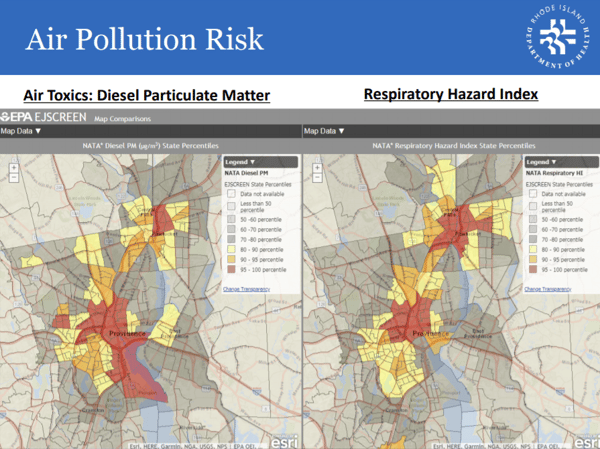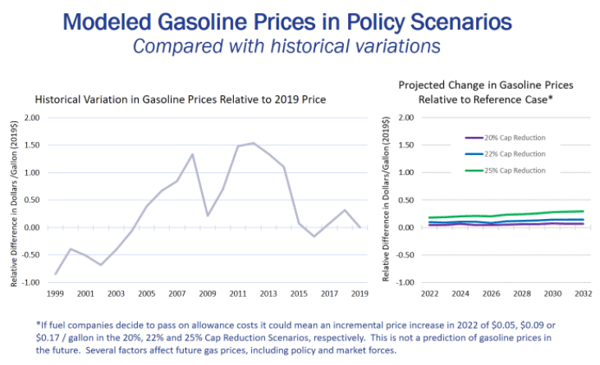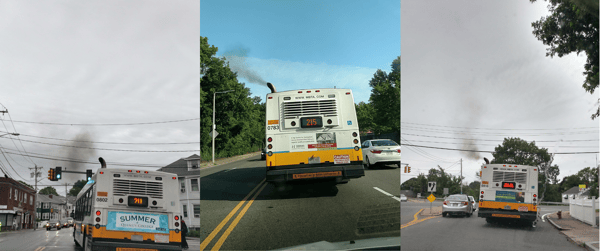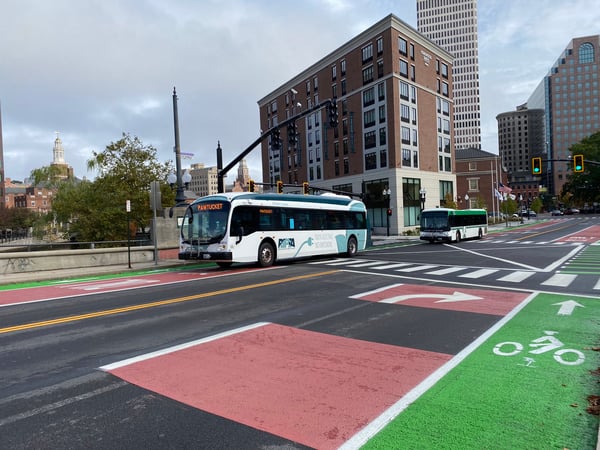-png.png) There is so much happening these days it’s hard to track everything, but if you haven’t heard much about the Transportation & Climate Initiative (TCI), you will soon. It’s an idea that could result in a compact of 11-states (plus D.C.) in the Northeast and Mid-Atlantic to address transportation emissions. It would do so by setting a cap on emissions, a cap that declines over time.
There is so much happening these days it’s hard to track everything, but if you haven’t heard much about the Transportation & Climate Initiative (TCI), you will soon. It’s an idea that could result in a compact of 11-states (plus D.C.) in the Northeast and Mid-Atlantic to address transportation emissions. It would do so by setting a cap on emissions, a cap that declines over time.
To sell gas and diesel fuel in the participating states, wholesale distributors would have to purchase special allowances auctioned off in amounts equal to the size of the cap. The proceeds from the auction sales would be funneled back to the participating states for use in combatting climate change. Note that some people call TCI, Transportation Cap & Invest. That works for us too.
TCI, if you really over-simplify it, has two parts: raising money (the states have to agree on how to do this) and spending that money on good things (each state gets to decide how to spend its share of the revenue, independent of what the others do). We support TCI because it will raise a significant amount of money regionally, and because each state will have the ability to dictate how it spends its money.
On Tuesday, September 29th, the TCI states held a webinar entitled “Ensuring Environmental Justice and Equity in a Regional Low-Carbon Transportation Program,” during which representatives from each of the participating states and many environmental justice (EJ) advocates shared their positions on TCI. Not all advocates agree on the equity implications of TCI, so we wanted to take a moment and share our thoughts on this topic.

Ultimately, we see our role as advocates as making sure the states sign a joint TCI Memorandum of Understanding (MOU) that sets participating states on a path of dedicated and prioritized investment to overburdened and under-resourced communities. But the work doesn’t end then. If and when TCI is implemented, our role (and that of other advocates!) will be to work year over year to make sure TCI funds are invested in a way that reduces greenhouse gases (and other pollutants) in an equitable way.
Where are we now with TCI?
The final MOU is due to be released this fall. At that point, the governors of the participating states will likely sign, thereby agreeing to a general plan with certain principles. After signing, each governor will take the policy back to their states, tailor TCI to their specific needs, and obtain whatever legislative or regulatory approvals might be necessary.
Many people who are engaged in the TCI discussions in the region are working on the plan, principles, and messaging. At the risk of oversimplifying things, here are the basics, with some editorial commentary along the way:
- At the core of TCI is the greenhouse gas (GHG) emissions cap declining over time. It’s likely that the final cap will be somewhere between a 20 and 25% reduction in transportation emissions from 2022 to 2032. With transportation emissions now the largest sector of GHG in the country, we can agree that emissions reductions of this scale (of course, ideally even bigger) are critical. Yes, there are other policies that reduce transportation emissions - and we need them as complements to TCI – but so far, we have not seen another state or regional proposal for reducing transportation emissions at this scale.
- Let’s be adult about the fact that TCI amounts to a gas tax, but one that will be assessed on wholesalers, not on retail customers. Economists will debate how much of the tax lands on the oil industry versus consumers. We believe that it will be split evenly and that there are ways to mitigate the impact on consumers in the short run. In fact, TCI modeling predicts that the impact on consumers will be far less than the swings in oil prices we have seen in the past 20 years. As time goes on, alternatives to the gas-powered car will prevail and the burden will shift more and more from consumers to the oil industry.
- The money that wholesalers pay for allowances will flow to each state. We can expect that the final MOU will have broad, general language about principles, but each state will have great latitude, both as they set up their respective systems initially and then as they appropriate money each year as the funds roll in. This is key, as we will discuss at length in this post
- According to the presentation of the September 29th webinar, there will be four main measures included in the final MOU to integrate key equity principles: a minimum allocation of 35% of funds for investment in disadvantaged communities, meaningful public participation, transparency in process, and a call to implement complementary policies to amplify the impact of TCI.
Why we support TCI
We hear some of the environmental justice advocates who have reservations about TCI or even oppose it. Some are concerned about the way it taxes petroleum, or oppose all market-based solutions, or doubt that the funds it generates would be disbursed equitably. Some distrust the process thus far and moving forward. We recognize these concerns and acknowledge the long history of harmful transportation planning behind them – but we see a path forward that is less dependent on gasoline and diesel fuel.

According to the RI Department of Health, diesel pollution overlaps with asthma risk, especially in low-income communities and communities of color. This is the same story as in Chelsea, MA and Chinatown in Boston.
We support TCI because we know advocates will have the opportunity to influence how that revenue gets spent, year after year. Whether TCI is going to be fair or not to everyone depends upon the state-level plans. The conversation and work do not stop with the signing of the MOU. We believe that any meaningful progress on climate justice will require years of intentional, focused advocacy. In this arena, that means advocacy on TCI and complementary policies. We plan to do both.
Regarding the distrust, we recognize that we cannot undo the history thus far, but we can do our best to make sure there is a transparent, inclusive, and accountable process within our states moving forward. Specifically, we support the establishment of an equity advisory committee in each state. The majority of representatives on those committees should be from frontline communities, and there should be stipends available to support their time.
Regarding the concerns that TCI will put an undue financial burden on those folks for whom energy bills are already a disproportionate part of their budget: honestly, some disadvantaged people are going to pay more for gas as a result of TCI. But there are ways to mitigate that impact by using the proceeds to provide them with better commutes, workforce development, and healthier air in their neighborhoods as a result of targeted, clean transportation investments. (Meanwhile, wealthy people driving big honkin’ SUVs will pay in more.) And if we spend the money fairly and wisely, there will be more affordable transportation options available and improvements to public health in communities that are overburdened by pollution.
There are a few more reasons why we are comfortable supporting TCI despite this unfortunate truth:
- Gasoline is a volatile commodity that changes price according to the global oil market. According to TCI program models, when you compare gas price fluctuations from the last twenty years to the potential increase in gas price from TCI, it’s clear that the added cost of implementing TCI is small compared to existing volatility of gas prices and the benefit of having a dedicated funding source for clean transportation investments.
 TCI would likely increase gas prices by 24 cents at most. In the last 20 years, gasoline costs have varied by as much as $1.50 compared to 2019 prices due to fluctuations in the global oil market. Source
TCI would likely increase gas prices by 24 cents at most. In the last 20 years, gasoline costs have varied by as much as $1.50 compared to 2019 prices due to fluctuations in the global oil market. Source
- TCI will include a strategy called a “Cost Containment Reserve” (CCR). Basically, if the allowance prices get too high, the CCR will trigger the automatic addition of some allowances, which will bring down the price. This mechanism will prevent allowance prices from getting too high, which will also mitigate the impact on consumers.
- The alternatives to raising the funds we need to address longstanding transportation problems, and related public health crises, aren’t enough: Without TCI, it’s not clear we’ll be able to raise the funds to make these necessary changes.
Alternative funding sources aren't enough
There are alternative ways to raise money for clean transportation improvements, but they simply won’t raise the level of funding we need. One such strategy is raising the more progressive state income tax. We support that way to raise revenue, but acknowledge that there are plenty of non-energy-related needs for that money, such as education and health care. We would be happy to join a coalition in favor of a progressive tax increase, but we think it’s not right or even politically astute to suggest that, if a tax like that ever passed the legislature or ballot referendum, that it would be earmarked to clean transportation. Furthermore, this approach would not have any effect on the price of what is causing our emissions problem – petroleum.
Another potential funding source, for the Boston area only, is congestion pricing. Major cities around the world are increasing tolls on cars entering the city during peak traffic times and putting the toll revenue to public transit. We strongly support this idea for Boston. It’s a smart, fair way to increasing funding for the MBTA, which desperately needs funding to bring service up to reasonable levels, let alone the build out the enhanced service that Greater Boston needs. Though an important tool, congestion pricing would not fund enough transit improvements and push emissions down by the amount of TCI. We need both to make the MBTA world-class and to support other clean transportation projects outside of Greater Boston.
The Promise of TCI: Investing in Clean Transportation Equitably
Turning our attention to how the money would be spent by each state (for us, Massachusetts & Rhode Island), we see enormous opportunities to use TCI revenue to advance clean transportation equitably, particularly if we intentionally target investments to communities that have suffered from decades of fossil fuel pollution and inadequate transportation infrastructure, particularly low-income communities and Black, Indigenous, and communities of color. TCI is not just about reducing greenhouse gases. It will also reduce the emissions that damage the health of people living where cars and trucks are driving through if we accompany TCI with important complementary policies.
The cap on emissions set by TCI alone cannot redress generations of harmful transportation policy. But it can raise revenue that the states can use to begin that work. Again, it’s our job as advocates to push for that now, in this final MOU stage, and to keep pushing for that within our states over the course of TCI’s lifetime. This work does not end. But for now, here are some of our favorite ideas for use of TCI revenue:
- Doing the basics to increase ridership on public transit, whether on the MBTA in Greater Boston, WRTA in Worcester, RIPTA in Rhode Island, or all the rest. We’re talking more frequent, timely service; comfortable, well-lit bus shelters; dedicated bus lines to speed up travel times; and stations that aren’t crumbling or leaking or otherwise threatening to fall apart.
- Making public transportation more affordable for low-income folks, including making some lines free.
- Electrifying medium- and heavy-duty vehicles, such as transit and school buses.
- Electrifying other vehicles that would otherwise run through the most polluted neighborhoods.
- Investing in walkable, bikeable neighborhoods.
Our plan is to align ourselves with the frontline communities to push for good projects that could be funded by the TCI.
 A collection of polluting MBTA buses on the roads in Massachusetts. TCI could provide the funding to electrify these buses to improve local air quality.
A collection of polluting MBTA buses on the roads in Massachusetts. TCI could provide the funding to electrify these buses to improve local air quality.
As with all policies, we’re looking at the benefit-cost ratio of TCI. By our math, the cost of the transportation upgrades we desperately need is significant, and TCI is a practical and critical funding source. As we see it, the benefits stack up mightily in excess of the costs. And within each state, we have control of the benefits; we can advocate for equitable use of TCI funds. Ultimately, the benefits and costs come as a package. We don’t see the potential for any other proposed policy that would provide the same level of greenhouse gas and public health benefits with the same potential for equity.
Governors - what say you?
We understand why some advocates are doubtful about how TCI would fund worthwhile investments. The governors have been talking amongst each other for long enough. They now have to step out and address the issues of concern. The time is now. It would be poor planning for the governors to be putting their political capital on the line for a gas tax increase without enabling a process that is inclusive with intentional engagement and sets a transparent path for where the money would go.

Photo courtesy of Brendan Carr
Perfection is not possible, but much better than we have now is possible
Our stance on TCI boils down to this: the status quo is inequitable, and though TCI is not perfect, it’s a step in the right direction - one that will ratchet down GHG emissions, raise revenue we desperately need, and provide a continued opportunity for advocates to press their respective states for clean, equitable transportation policy.
If you agree with us, disagree with us, or are somewhere in between, we encourage you to express yourself. You can:
Tell the governors and state leaders you want transparency and a commitment to dedicated investment to underserved and overburdened communities with local control on how those funds get spent. Then plan to keep engaging your governor and legislators to hold them accountable for a TCI program that delivers on those commitments.
-png.png) There is so much happening these days it’s hard to track everything, but if you haven’t heard much about the Transportation
There is so much happening these days it’s hard to track everything, but if you haven’t heard much about the Transportation 


 A collection of polluting MBTA buses on the roads in Massachusetts. TCI could provide the funding to electrify these buses to improve local air quality.
A collection of polluting MBTA buses on the roads in Massachusetts. TCI could provide the funding to electrify these buses to improve local air quality.
Comments